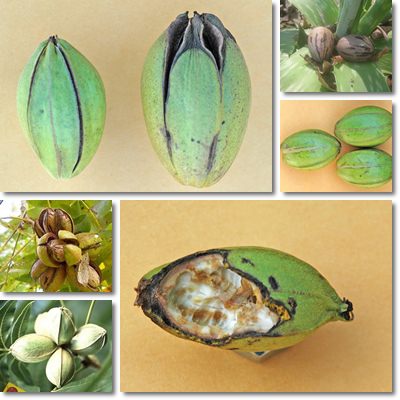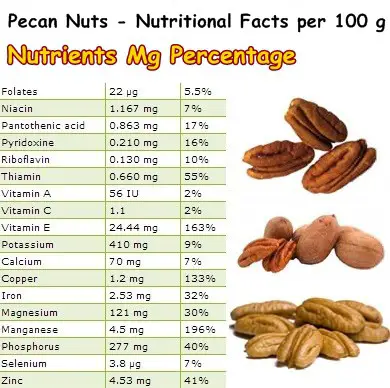The fruit of a widespread hickory tree, pecan nuts enjoy great popularity, especially in American cuisine. Native American were especially fond of this nut variety, which was an important part of their diet. Pecans, as some like to call them, are a rich source of essential nutrients required for staying in good health. They are mostly known for their high monounsaturated fatty acid content, an important factor for cardiovascular health. However, pecan nuts boast a variety of health benefits which we will address in today’s article.
What do pecan nuts look like?
Pecans (Carya illinoinensis) are a variety of nuts similar in appearance to walnuts. They are covered in a bright-green outer husk which tends to fall off when the nut is ripe. Underneath it is a hard, elongated, smooth, brown shell which needs to be cracked in order to reach the delicious, golden-brown nutty flesh. The nut-proper is oval, elongated, slightly more slender and finer than a walnut kernel, with relatively deep, long indentations. And here is an interesting fact: pecans are the symbolic tree of the state of Texas.

What do pecans taste like?
Overall pecans taste similar to most other nuts: nutty taste with a smooth, buttery flavor. There is somewhat of a difference in taste between freshly shelled, raw pecans and dried pecans in the sense that the first have a lighter aromatic profile with milky, almost sweet, nutty flavor notes, while the dried pecans flavor is more developed and the texture hard and crunchy. Pecan nuts are also somewhat sweet naturally. However, if your pecans taste rancid or downright bitter, then they’ve likely gone bad.
Can you be allergic to pecan nuts?
Pecans provide excellent nutritional value and can be a great addition to any diet, provided the person consuming them does not have a pecan or multiple nut allergies. If you have never eaten nuts before, but suspect or are allergic to some varieties, it is best to avoid consumption and ask your doctor for an allergy test called ‘skin prick testing’.
This simple test will reveal any potentially harmful allergies you might have to nuts, pollen, dust or other common allergens. If it is revealed you are indeed allergic to pecans or other nut varieties, the only safe solution is to avoid eating them.
Otherwise, pecan and other nuts are an overall healthy, nutritious food with several wonderful properties and health benefits. Their therapeutic action is a direct result of the generous vitamin, mineral and fats content they provide. Regular consumption has been found to be extremely beneficial for human health and, as several long-term studies reveal, it brings cardiovascular, digestive, anti-inflammatory, antioxidant and nervous system benefits.

What are the benefits of pecans?
The health benefits of eating pecan nuts are the same as eating other varieties of nuts. If you are lucky enough to not be allergic, then you should definitely consider including them in your diet, no matter the variety: pecans, walnuts, peanuts, hazelnuts, almonds etc. Pecans, for example, are rich in monounsaturated fatty acids, a type of essential fatty acids with wonderful benefits. A regular intake appears to efficiently lower LDL (bad) cholesterol levels and increase HDL (good) cholesterol levels, making pecans extremely good for cardiovascular health when part of an overall balanced, varied and natural diet.
In addition to this, they contain a variety of antioxidant compounds such as ellagic acid, but also monounsaturated fats like Omega-6 fatty acids (linoleic acid) and Omega-9 fatty acids (oleic acid) with proven antioxidant benefits. Antioxidants protect our skin, brain, internal organs, blood vessels and tissues in general from oxidation caused by reactive oxygen molecules called free radicals. They exert anti-aging effects and anti-inflammatory properties.
Pecans also contain impressive amounts of dietary fiber: 9.6 g of fiber per 100 g of kernels. Dietary fiber is plant material that goes undigested, but serves certain beneficial purposes. Firstly, it binds to fats in the intestinal tract, reducing their absorption. This indirectly reduces blood cholesterol levels, contributing to cardiovascular health.
Secondly, it helps with weight loss as a result of the same mechanism. Dietary fiber also boasts digestive benefits, contributing to better digestion and improved transit time. Lastly, nuts like pecans that are rich in fiber are a great solution for constipation and a wonderful food for hemorrhoids.

Pecans are a great source of phytochemicals, natural compounds with antioxidant action. Examples are vitamin E and carotenoids with powerful antioxidant activity like beta-carotene, lutein and zeaxanthin. Vitamin E has a protective effect on the lungs and is a great natural emollient and skin antioxidant, while the above-mentioned carotenoids counteract free radical damage to our eyes, promoting good vision and healthy eyesight. Although they come in small amounts, lutein and zeaxanthin are especially healthy for the retina.
Also, ellagic acid, which is a natural phenolic compound, can inhibit certain carcinogens such as nitrosamines and polycyclic aromatic hydrocarbons from binding to our DNA and causing cell mutations leading to cancer. Moreover, pecans boast a rich vitamin and mineral content.
As you can see in the nutrition table for pecan nuts above, 100 g of fresh kernels provides 163% of the recommended daily intake of vitamin E. This potent lipid-soluble antioxidant is required for maintaining the integrity of cell membranes, mucous membranes and skin. Also, pecan nuts offer a variety of B vitamins, the most notable of which are thiamine, pyridoxine, pantothenic acid, riboflavin and folic acid.
B vitamins are vital for energy metabolism and a generous intake contributes to elevated energy levels, combats fatigue and stress. Moreover, B vitamins promote digestive health and support nervous system activity and brain health. Not only pecan, but most nuts are a generous source of B vitamins, hence their highly beneficial action on our health.
Pecan nuts boast a generous mineral content as well. For instance, 100 g of pecan kernels contains almost 200% or the RDI of manganese, a mineral with important antioxidant properties. Manganese is not only part of our body’s natural antioxidant defense mechanisms, but also regulates thyroid hormone production and activity. Pecans also provide impressive amounts of copper (133%), zinc (41%), phosphorus (40%), iron (32%), magnesium (30%) and small amounts of selenium.
A sufficient intake of dietary copper is known to help prevent premature hair graying and eye discoloration. Zinc is vital for a strong immune system response, while phosphorus is good for strong bones and osteoporosis prevention (along with calcium, vitamin D and magnesium). Iron prevents anemia and fatigue and supports tissue oxygenation and good energy levels.
Selenium is vital for thyroid health because it supports the production of thyroid hormones. Magnesium is required for strong, healthy bones and teeth, better blood pressure numbers, reducing anxiety, preventing and managing depression, for better stress-coping mechanisms and may even hold benefits for blood sugar metabolism in type 2 diabetics or pre-diabetics.
Also see: can you eat pecans with diabetes?
Considerations
However, there is no such thing as the ideal food. Eating should always be balanced and we should consider both the health benefits and the side effects of foods. Take pecans. Despite their wonderful benefits and excellent nutritional value, they are rich in fats and eating excessive amounts can, over time, result in weight gain and produce negative effects on cardiovascular health, for example. Too much dietary fiber can also have an anti-nutritional action, reducing vitamin and mineral absorption in addition to causing loose stools, diarrhea and digestive discomfort.
Conclusion
All things considered, pecan nuts are a healthy food choice. Only one handful of pecans every two days can ensure an adequate intake of vitamins and dietary minerals and help keep us in great health. Not only do they contribute to healthy and beautiful skin and hair, but they also boast antioxidant and anti-aging properties, help prevent fatigue, improve energy levels, maintain bone health, regulate thyroid function and blood pressure, improve digestion, lower blood cholesterol levels, among other similarly impressive health benefits.
